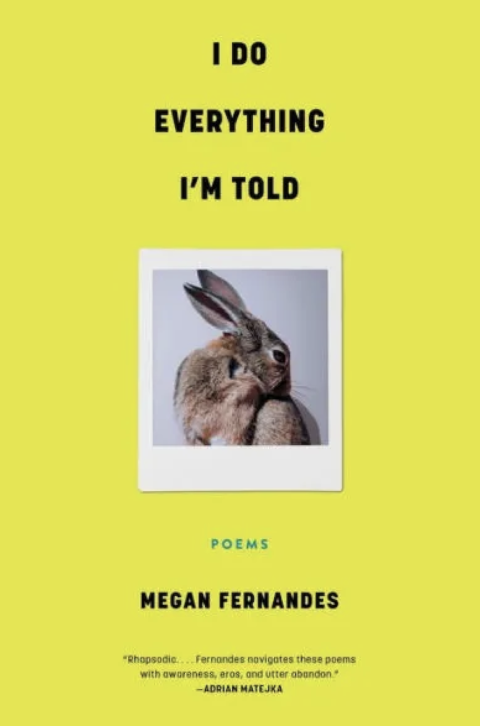I Do Everything I’m Told is bookended by love poems (opening with “Love Poem,” and ending with “Tired of Love Poems”) but also by the mythopoetics of joy, a rococo counterweight to the “ugly feelings” framing discontents of late modernity. From “Love Poem”: “We almost crashed a wedding that night / at the Boathouse but lost our nerve. We were not / dressed for the caper, but even this felt like rogue joy. / Yes. It was joy, wasn’t it? Even if it was ugly, it was joy.”
 The speaker acknowledges her complicity in the “graveyard of capital” in “Too Much Eliot”: “Easier to blame / the world falling apart / than to say it’s you.” But throughout, the focus is less on the self, or on shaming the world or self (From “Letter to a Young Poet”: “Wellness is a myth and shame transforms no one”), but on the ways that poetry establishes personhood, imaginative sympathy, and identifications with the world outside the self, including international cities (these poems take us between Shanghai, Lisbon, Palermo, Paris, Tanzania, Zurich, Venice) and the US. This capaciousness leads the speaker to see the humanity of others as her own. In “Semiotics,” a friend asks the speaker to join him on a trip to the Maldives he booked on a credit card: “What should I say to him? / That I admire his audacity / to be ill? That he knows / to be ill is natural / given the state of this world, / and how is everyone / not ill, not overdosing / on the night?”
The speaker acknowledges her complicity in the “graveyard of capital” in “Too Much Eliot”: “Easier to blame / the world falling apart / than to say it’s you.” But throughout, the focus is less on the self, or on shaming the world or self (From “Letter to a Young Poet”: “Wellness is a myth and shame transforms no one”), but on the ways that poetry establishes personhood, imaginative sympathy, and identifications with the world outside the self, including international cities (these poems take us between Shanghai, Lisbon, Palermo, Paris, Tanzania, Zurich, Venice) and the US. This capaciousness leads the speaker to see the humanity of others as her own. In “Semiotics,” a friend asks the speaker to join him on a trip to the Maldives he booked on a credit card: “What should I say to him? / That I admire his audacity / to be ill? That he knows / to be ill is natural / given the state of this world, / and how is everyone / not ill, not overdosing / on the night?”
The Whitmanian eros and largesse of the speaker extends also to difficult subjects: the person with whom she watches a film about fisting and “near-annihilation” argues, “To be taken apart is as important as being put together,” and a lover bruises her wrist, telling her “I am your goddamn slum / experiment,” to which the speaker rejoins, “No. Just the cruelest person I have loved.”
The speaker’s maximalist aesthetic penetrates the realm of feelings and affect, as well. In many poems, there is crying, such as in “Space Cowboi,” a poem that ends, as many of these poems do, with a focal shift from the personal or subjective to the global, cosmic, and philosophical:
I tell you about a French poet
who described the universe
as eternally undressing
out of an infinite gown
and you gasp before
we both go quiet. Out here,
we spin and tell jokes
and while I rehearse
K-pop for you
on a thawing moon,
how can it be that
on Earth, we are nothing?
At times, the speaker welcomes ego death or her own diminution before nature, as in the poem “Catskills,” about a year of anhedonia, with nothing desired but Zoloft, ending: “I just want // to be dwarfed / by everything these days,” recalling Romantic terror before the negative sublime.
Epistemic limitations are also foregrounded. From “I’m Smarter Than This Feeling, But Am I?”: “At a party last night in Chinatown … Everyone is a producer / and talking about Kathy Acker and what would I say / if I could? That I want our years to keep meeting … We put the art between us because the art exists / and we do not. This is called sublimation. / We puppet our meat in the grey twilight of the real world / and I pretend I’m not speaking to Time.”
The echo between “the art exists / and we do not” and “we are nothing” (from “Space Cowboi”) reverberates throughout the collection, a kind of existentialist dread and crisis of language and representation that often yields silence, or nihilism, defended intellectually in “Companion”: “But a smart person knows / there’s nothing / at the end of the world.”
More often, though, it yields questions and poems that contemporize ancient and lyric myths in a way that morphs our absence of certainty or existence into negative capability, rather than a cause for paranoid readings of the world. From “Rilke”: “See, I think Orpheus knew. Had always planned to turn back / and homegirl knew, too. // That’s a kind of smart. To know what you know. / To know what your man can and will do // and how it will be later told.”
 In “Semiotics,” Fernandes illuminates a poet’s symbology: “I went to the Rockaways / to look for dolphins // saw three, and assigned each of them / a meaning. I called it a sign. // This is what I do. Find a noun, / usually an animal, and give it // an intervention in my life. / And if there is sudden rain? // Even better. I don’t believe / in coincidence.” Ending with “the interventions / I believe in / are not earthly … One must look for signs / to believe in them,” Fernandes inscribes intentionality and belief in our witnessing and interpretation of the world.
In “Semiotics,” Fernandes illuminates a poet’s symbology: “I went to the Rockaways / to look for dolphins // saw three, and assigned each of them / a meaning. I called it a sign. // This is what I do. Find a noun, / usually an animal, and give it // an intervention in my life. / And if there is sudden rain? // Even better. I don’t believe / in coincidence.” Ending with “the interventions / I believe in / are not earthly … One must look for signs / to believe in them,” Fernandes inscribes intentionality and belief in our witnessing and interpretation of the world.
Alive to power dynamics, and to how we all serve someone or something, whether a person, god, or ideology, the title poem opens: “In Venice, there is always drama/ around the corner … You give me / that cathedral feeling and wipe rain // from blooms of jasmine shrubs / on my arm while I speak to Giovanni // about Italian boxing.” That night, she “put(s) on a playlist called / I do everything I’m told, and can’t tell / what is kink or worship or both.” While establishing a fervor around devotion, Fernandes also speaks to our unmet cultural need for rituality, described by Byung Chul-Han in The Disappearance of Rituals as a “mutual praxis of recognition borne by the ritualistic sharing of the symbolic between members of a community which creates the footholds of objectivity, allowing us to make sense of time.” From “Letter to a Young Poet”: “In the absence of recovery, some ritual. In the absence of love? Ritual.”
Fernandes’ formal adventurousness (along with the crown of sonnets, the collection includes a “Fuckboy Villanelle,” experimental ghazals, and a wide range of metrical and stanzaic choices) is mirrored by the speaker’s actual adventurousness, given the collection’s numerous locales and trope of nomadism and homelessness. From “Drive”: “There is no home / and nothing to return to, just a series of shadows, partial signs of presence: a flickering.” While at least two poems engage with imagined futurities (in “Orlando,” the speaker imagines the baby she lost after a few weeks of being pregnant as an adult son and drummer), the poems respect the boundary between the imagined and the real, and are evocative and sensorily grounded.
This is a “new origin story” of queer desire reminding the reader to look no further than their own body to celebrate these incanted states of longing, grief, wonder, and awe. In so doing, she defends not just joy, but also poetic language and its powers of reconstitution, circling around the Derridean deferral of meaning. The book ends: “We wish to worship more than just each other … You approach on a red bike in summer/and the poem takes shape. I entitle it / anything but Love, anything but what it is.”
[Published by Tin House on June 20, 2023, 104 pages, $16.95 paperback]